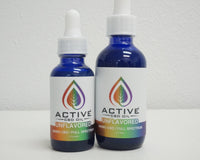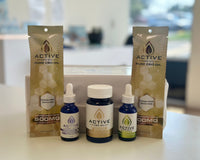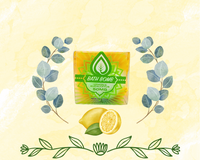
Going on a trip, whether you’re traveling over borders or over state lines, welcomes many new and exciting experiences. However, for those who regularly use CBD products to manage their pain and comfort, traveling can present its own set of unique challenges. With the constantly changing rules around hemp based products worldwide, this leaves many regular CBD users asking themselves, “Am I going to get myself in trouble?”
In this guide, we aim at demystifying the idea of traveling with CBD so that you can embark on your journey with the knowledge and confidence you need surrounding your CBD products.
Before getting too far into this blog though, I would like to remind you that the laws surrounding cannabis and hemp are constantly changing around the world so make sure to reference the most up to date laws and policies before traveling with your CBD.
The Different Types of CBD
Before diving into the specifics of traveling with CBD, it is important to understand what exactly is inside your products. There are 3 types of CBD to be aware of, full spectrum CBD, broad spectrum CBD, and CBD isolate.
With full spectrum CBD, you are utilizing all of the 100+ cannabinoids and compounds present inside the hemp plant. This includes THC in trace amounts as well (0.3% or less) which in many cases helps the CBD achieve its full effect, however out of all of the different types of CBD, this one may present more issues while traveling due to the fact that it contains THC.
Next on the list is CBD isolate. While full spectrum products contain the full hemp extract, CBD isolate products are made using only pure CBD extracted from the rest of the plant. Without any trace amounts of other cannabinoids, this makes CBD isolate based products arguably the safest type of CBD to travel with.
Finally, we have broad spectrum CBD. As mentioned previously, the hemp plant contains over 100 different compounds, all with varying effects. Although some get better results from taking full spectrum CBD, others may not want any THC at all. This is where the broad spectrum shines, allowing access to other cannabinoids such as CBN and CBG but without the trace amounts of THC. For more information about the different types of CBD, you can check out our other blog on the topic HERE.

With the passing of the 2018 Farm Bill, hemp-derived CBD has been removed from the controlled substances list and legalized across the country. This law makes it so that as long as CBD products being sold are derived from hemp that has a THC content below 0.3%, they are no longer considered illegal at a federal level. This change has granted much sought-after liberty to CBD users who are on the move, now being able to travel freely across the nation with their preferred CBD oils, edibles, and topicals without looking over their shoulders for any legal consequences that might follow.
In 2024, 6 years after the passing of the Farm Bill, more people across the country discovered the potential benefits of CBD and CBD products are more easily accessible to the public than ever. That being said, there still are some varying laws for certain states that regulate CBD heavier. For these states you may have to be a bit more careful.
CBD in Idaho/Kansas

Although federal law allows the purchase of hemp derived CBD products, certain states such as Idaho or Kansas pose much more strict regulations on CBD. These states have banned the sale of CBD products that contain even trace amounts of THC while it remains legal to purchase in most other states. This is where it's helpful to know if your CBD is a full spectrum, broad spectrum, or CBD isolate product as this will tell you if your products contain any amount of THC. With this being said, full spectrum CBD users might need to find a different CBD product for their family vacation to Idaho. Every state is going to have its own laws surrounding CBD so make sure to look into the specific laws for where you are traveling to. For more specifics on these specific states’ policies for CBD, check out these government resources I have linked below.
Idaho Office of Drug Policy CBD Information: https://odp.idaho.gov/cannibidiol/
Kansas State CBD Information: https://kansasstatecannabis.org/cbd
CBD Outside of the U.S.
Exploring the globe with CBD can get tricky. In the U.S., hemp-derived CBD with less than 0.3% THC is legal, yet other nations have drastically different rules about CBD and cannabis products. Some countries now allow CBD products to be sold openly, but in other nations, there are strict rules or even complete bans on CBD. Bringing CBD on international trips risks items being seized or legal issues if authorities view your CBD products as illegal, even in countries where CBD is fully legal.
For example, the laws inside Mexico allow purchase of CBD products that contain up to 1% THC, which is even higher than what is allowed in CBD products within the United States. However when entering the country, it is important to make sure your CBD is labeled as “hemp-derived” even if the THC content is within the legal limits of where you are traveling to. Even then, if you are traveling to a country where CBD is already legal such as Mexico, it might be a better idea to just purchase your CBD after you're there to avoid any possible issues with customs.
Mexico is an example of just 1 of the many different countries that permit the sale of CBD, so if you’re traveling somewhere else besides there, make sure to look into the laws so you can enjoy your traveling without any hang ups. I also recommend looking at this handy resource published by CMS, a European international law group that provides extensive details on the legal status of CBD for over 30 countries around the world. Additionally, Grass Fox is an app that can show you the most up to date cannabis laws around the world. It costs $4.99 but could be helpful for researching further on the laws of where you are traveling to. Rule of thumb though is that if there are trace amounts of THC in your CBD, make sure your CBD is labeled properly or just leave it at home.
3rd Party Lab Tests
One practice that could save you potential stress during your travels is to keep the lab tests for your CBD products printed out and handy. Many times you can find these results on whatever company's website you purchased the CBD from. This can be useful if you are traveling to places where you may have to declare your CBD for products, allowing airport staff to see the exact chemical contents of your CBD. The difference between an isolate product and a full spectrum product could be what gets you in trouble so it's always important to research your travel destinations as well as what's inside the products you plan on taking with you.
Safe Travels with CBD

Traveling with these sorts of products can certainly be nerve-wracking, especially if you’ve never done it before. Hopefully after reading this blog you have the certainty that you need to relax on your trip without having to compromise the CBD products you love. Again, laws are very different around the world so make sure to look at the resources I have linked throughout this article to learn more about your travel destination and their laws surrounding CBD. Travel smart, stay informed and let your journey be worry-free! If you have any personal experiences or tips about traveling with CBD, feel free to share them in the comments below. Your insights could help fellow travelers navigate their own adventures. Stay tuned for more CBD tips and updates, and remember, the world is your playground, explore it with peace of mind and your favorite CBD products by your side. Happy travels!


























